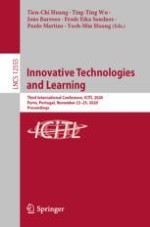2020 | OriginalPaper | Chapter
Integration of LUPDA Theory and STEAM with Computational Thinking Concepts to Develop Assessment Principles for an AI Based STEAM Activity
Authors : Chih-Hung Wu, Yueh-Min Huang
Published in: Innovative Technologies and Learning
Publisher: Springer International Publishing
Activate our intelligent search to find suitable subject content or patents.
Select sections of text to find matching patents with Artificial Intelligence. powered by
Select sections of text to find additional relevant content using AI-assisted search. powered by
